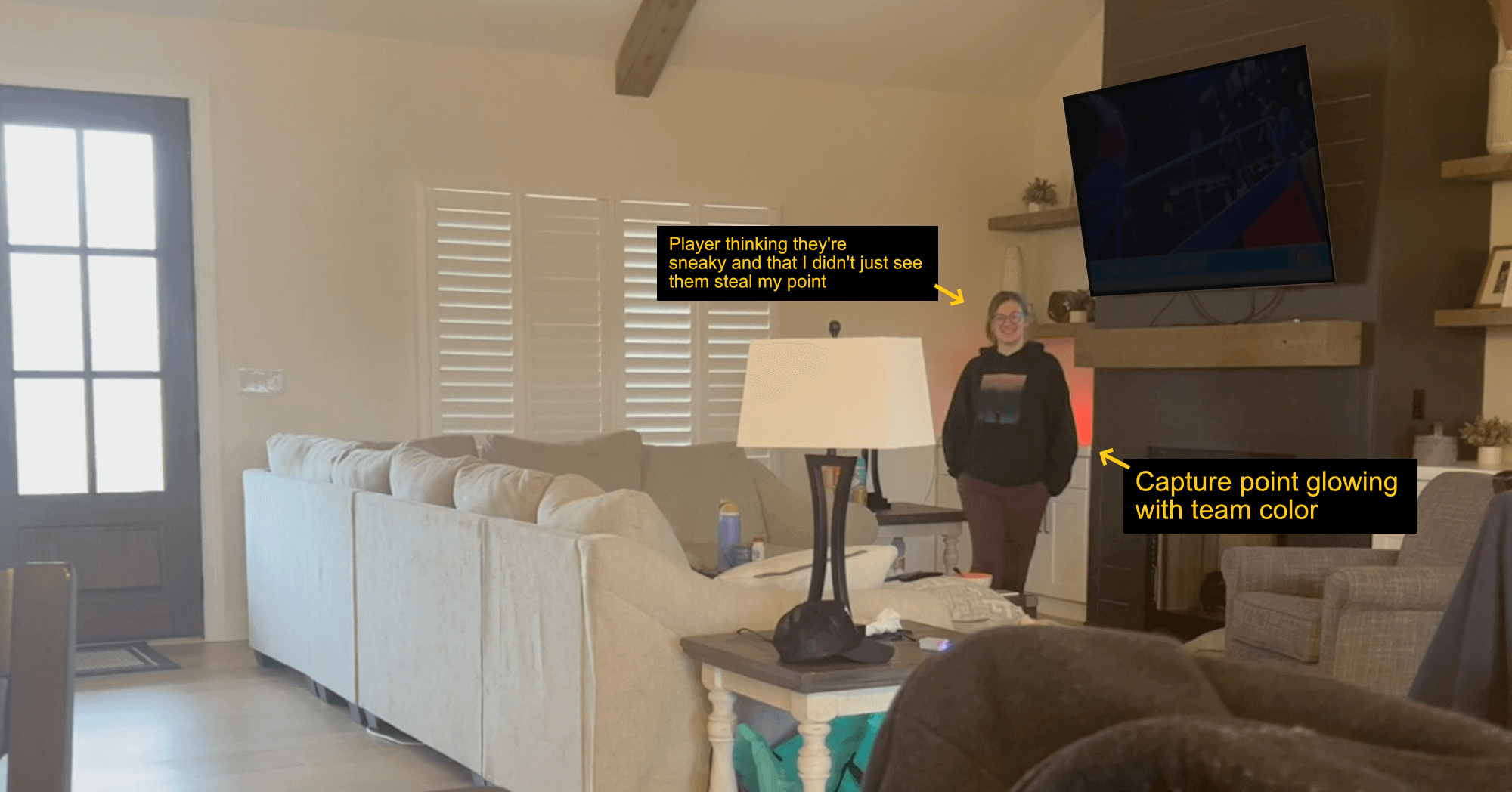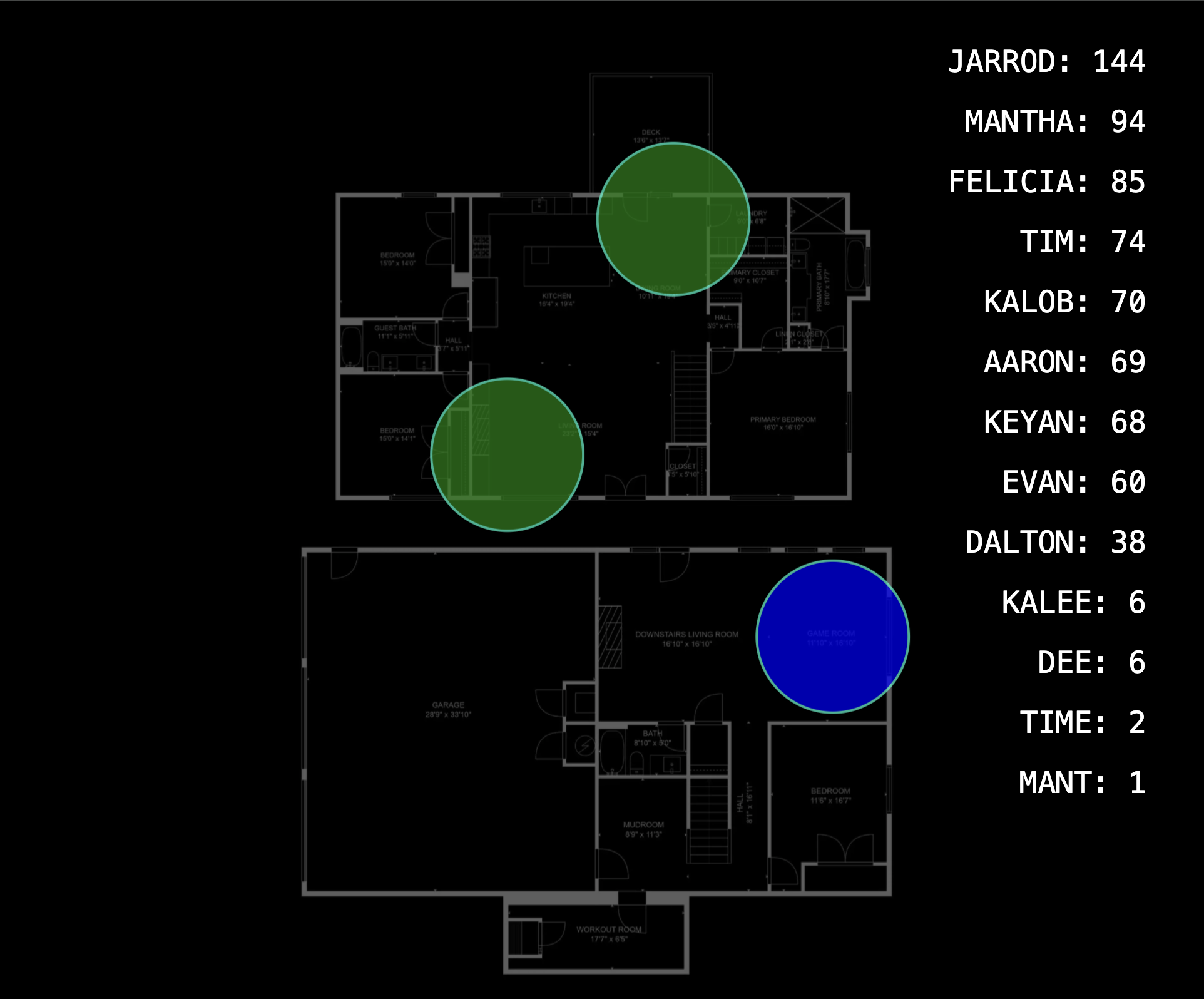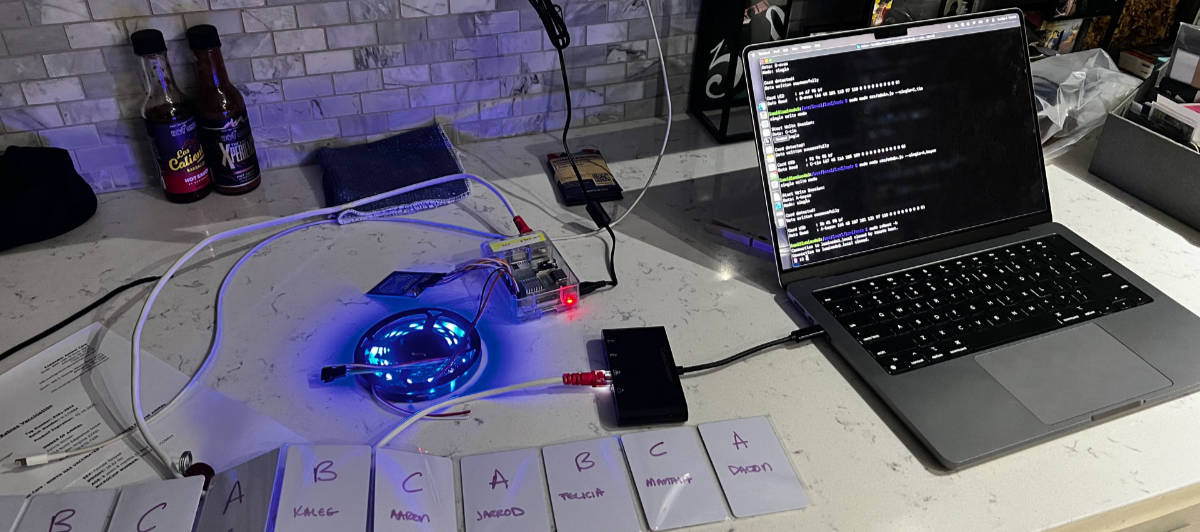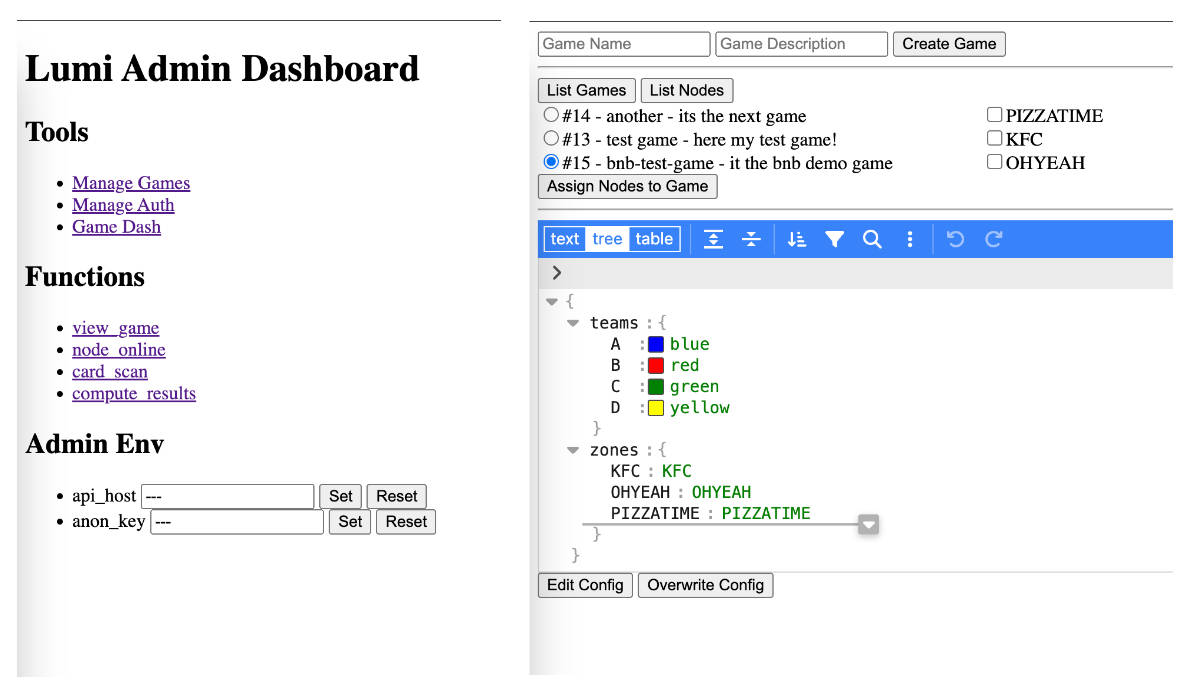
Imagine playing king of the hill as a kid, but when you capture the hill the whole landscape around you is illuminated with light and color. That's the big vision for this small game prototype.
I wanted to make a game, that takes place in the real world involving no phones or other devices.
Built with Raspberry Pi’s, NFC readers, LED strips, and Supabase. The goal of the game is to capture and hold and many capture points as you can, stealing them back from other players, and sneaking off the gain control for your team.
Contents
The Game
“Multi Hill King of the Hill” is the best one phrase explainer I’ve found so far. The goal is to capture areas for your team by swiping your NFC card at the control point.

Players compete for control of each zone, both to gain their team capture time as well as capture points for themselves.
An scoreboard then displays captured areas as well as a leaderboard.

The Tech
Each node / "hill" consists of:
- Raspberry Pi 3B+
- WS2182 Light Strip
- RC522 NFC Reader / Writer
I enjoy working within Raspberry Pi well-trodden ecosystem. They are often overkill for projects, but its great to continue working in a familiar Linux environment.

The capture point is written in NodeJS, with the help of some awesome packages, namely node-rpi-ws281x-native and mfrc522-rpi.
Each card has a hex-encoded string written to it that decodes to something like `B-taco`. The first letter being the team, and second being the player's code name.
When a scan happens the Pi debounces the scan event (as they can happen in quick succession) and then shoots up the data to a simple Supabase project with a few endpoints. A lot of fun insights can be derived from the data, see the play test below for what I pulled out.
Each scan event is stored as an event queue so that game node are mostly stateless and the data can be replayed and parsed later.

Game sessions, node assignment, and project endpoints can be managed via a super rough dashboard I slapped together. I enjoyed working framework free and keeping it as barebones as possible.
The scoreboard page uses Supabase Realtime to provide instant updates to the capture state of each node, as well as keep the leaderboard up to date.
Play Test
I was planning to have a get-together with my friends in an Airbnb, and I realized that would be perfect opportunity to try out the game!
Teaching
I didn’t get a representative experience of introducing the game to players as all involved were close friends and more or less taught each other. However I did learn a few things:
- 🖼️ Show Don't Tell All the words in the world didn’t compare to swiping a card and seeing the color on the point change. The actual demo following by a suggestion of how to be competitive got people interesting and playing right away.
- 🙋 Personally Relevant Goals First Intially, I started introducing the team goals like holding the point for your team and total capture time. But quickly I realized players cared more about their personal actions and contributions, so I started introducing that first. I’m still personally interested in the team aspect so I’ll likely spend time juicing the experience of contributing to one’s team with team leaderboards and other stats.
Player Feedback
I got tons of great feedback as I discussed with players, each had their different play styles and focused on different parts of the game.
- 🏆 Desire for Leaderboard Universally, all players wanted to see who had the most scans. I incorrectly assumed team play was more interesting but quickly pivoted.
- 🔒 Lockout Time “Steals” happened frequently. Players capture a point, and then another competitive player would sneak up right behind them and recapture the point. Several players brought up that a lockout time would feel better, so their progress wouldn’t immediately be wiped away. I like this idea, but will likely implement it with a light touch as not to discourage the highly engaged stealing players.
- 📝 Genuine Product Direction from Players Gathering feedback directly from engaged players was a rush. Being surrounded with players having discussions and combined with the agency to make any changes I felt necessary was a beautiful taste of true user focused design.
Parsing Data
A few days after the game was complete I parsed out all the scan events to determine the winner, as well as some interesting stats!



Team based stats were less interesting in this play test, but I think with the right visibility team based play could be made really fun for players.
Next Steps
As I have time I want to polish the game, to make it as beautiful a process as possible, more so than expanding with new features. Here are a few things that I've been ruminating on:
Improvements
- 📡 Local server support There's not really a need to a central online server, I could instead use a command node and keep the game local to the network.
- 🔧 Use GUIDs + registration flow to Setup Cards Currently each card must be burnt with a team code and player name, just use the built in GUIDs instead and register each card to a user name.
- 🔒 Add Lock Out time with Visual Effects As mentioned, prevent instant steals from watchful players. There's opportunity for a high affordance design, gradually fading into the new colors.
- 💡 Control External Lights via API To control a larger universe of lights, have a local command node find and set lighting for node zones.
- 🤏 Shrink nodes from Pi to ESP32 Raspberry Pi is super duper overkill for these little scanner nodes.
- 🌗 Prevent Partial Scans Sometime I received partial scans from the NFC cards. I'm not sure why this happens but there ways to check for and prevent this.
Takeaways
- 🛝 Rediscovering Playground Mentalities The childlike playground mentality is essential when thinking about and explaining games. It took a minute to get back into but I loved living in that space during the play test. Initially the game was called "Lumi" but "CaptureTag" (as suggested by my friend Tim) explains itself and communicate the correct level of anti-serious playfulness.
- 🏅 Competing for Most Scans is Fun Players talked the most about on upping each other, and loved seeing their numbers go up!
- 🪪 Players Lose Cards Be able to ready to make backups 🙂
- 📺 Prevent Burn In When displaying the leaderboard on a TV, have tools to prevent burn-in, such as a slight wiggle and dark mode.
Thanks!
Creating an physical game with the tools of my incredibly virtual trade was very gratifying.
For those curious to see the code, it's pretty simple and might serve as an example for some basic LED + NFC integration in Node.
View the "Lumi" repo on Github here
My side project mindset in the past has been very business focussed, and I'm excited to build more projects around providing fun and pleasure than extracting money.